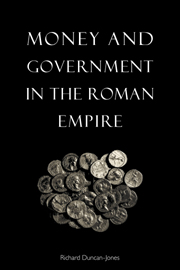Book contents
1 - Surplus and deficit
Published online by Cambridge University Press: 08 October 2009
Summary
INTRODUCTION
When chance winds drove a Roman tax-collector from the Red Sea to Ceylon, the island's king was said to be much impressed by the consistent weight of the silver coins that he brought with him. But an observer meeting it in the twentieth century would be more likely to notice the diversity of Roman coinage, not merely its varied coin-types, but also the inconsistent weights, differing standards, and irregular shape. Some of this diversity obviously reflected mass production in a traditional society with pre-industrial technology. But there are other features of the Empire which throw light on Roman minting policy and the monetary role of coin.
The Empire of the Principate was not fully monetised, and the state collected much of its revenue in kind. Big private estates, like small peasant farms, were said to aim at self-sufficiency and to avoid the market place where they could. But at the centre, there is little sign that the government could do without money, except when it distributed some of its grain revenue to a privileged elite. Money was of the utmost importance for the state's biggest spending commitment, maintaining a large army. Budgetary problems showed themselves in the form of shortage of money. A state which functioned in this way was almost bound to turn some of its regular revenue in kind into cash through the market-place.
But in its fiscal operations, the Roman government seems to have done without credit.
- Type
- Chapter
- Information
- Money and Government in the Roman Empire , pp. 3 - 19Publisher: Cambridge University PressPrint publication year: 1994
- 1
- Cited by

